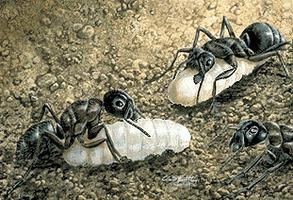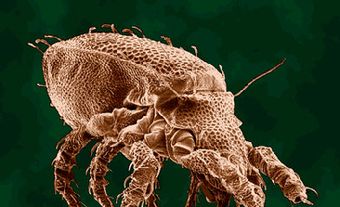
Ant, common name for small, mostly ground-dwelling social insects of family Formicidae, order Hymenoptera. Ants are the most numerous insects. An estimated 12 000 species occur worldwide, about 186 in Canada. They are black, red, brown or yellow; smooth, hairy or spined; and characterized by a slender waist at the base of the abdomen, bearing 1 or 2 beadlike enlargements. Heads are large with elbowed antennae and, usually, well-developed mouthparts. Workers are wingless; reproductives are usually winged, mating in flight. After mating, the queen sheds her wings and excavates a chamber where she lays eggs. The first larvae are tended by the queen; later broods, by workers.
Ants are the most diverse and specialized social insects. They occur from the tropics to the arctic tundra, and on most islands. Nests of some primitive ants may never contain more than 12 individuals, while those of highly social species may comprise millions. Ants prey on other insects, eat seeds, tend aphids for honeydew excretions or cultivate fungus gardens. Some ants raid nests of other species, capturing slaves which they carry back to work in their own nests. Certain species are specialized social parasites, existing only in nests of other ants.

 Share on Facebook
Share on Facebook Share on X
Share on X Share by Email
Share by Email Share on Google Classroom
Share on Google Classroom


